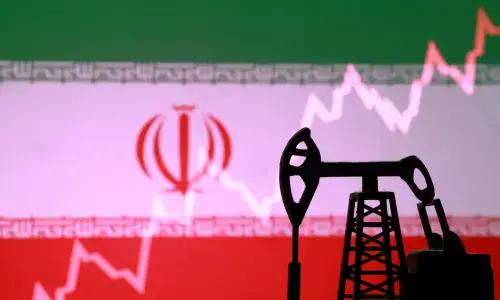The Pugwash Council
I HAVE been a Dawn reader because of its impartial and accurate coverage. I was therefore shocked to see a report in Dawn on March 13 under the heading ‘Objectionable Speeches’. Please permit me to give you some facts.
The Pugwash Council is an international organization founded in 1957, and it has held over 280 meetings in various cities of the world since then. The Council promotes peace and security world wide. I am not a member of the Council but I received an invitation to attend the seminar organized by it in Lahore.
This was the first such seminar being held here and may have served to make Lahore an attractive venue for events by international organizations because of the excellent hotels, new airport and a good climate. It was in this spirit that I accepted the invitation to participate. The other invitees were retired and serving government officials, retired and serving military personnel, prominent writers, bureaucrats, professors and scientists.
As far as I know, the CIA has nothing to do with Pugwash and, in any case, the Council is doing nothing to help the CIA. The meeting was not a ‘clandestine meeting’. The government was represented and foreign participants had come on valid visas on scheduled flights. The US, Russian and European experts were invited to give us the benefit of their experience of nuclear matters during the Cold War.
The seminar was on ‘Avoiding India-Pakistan Nuclear Confrontation’, and an Indian participant was there to give their point of view. All invitees participated in their individual capacities. The conference was held under ‘Chatham House Rules’ that do not allow press coverage and nothing can be attributed to anyone. Most international conferences follow this format in the interest of a free discussion.
I did not give a speech at all, nor did I submit a paper. So the question of making an objectionable speech does not arise. No other participant said anything that could be considered objectionable. The thrust was towards evolving suggestions for conflict resolution in South Asia so that the danger of a nuclear war is minimised. There was no discussion of religion or religious elements as reported in your paper.
I do not wish to blow my own trumpet by recounting my role in Pakistan’s acquisition of a nuclear capability, but since your reporter has attributed totally wrong views to me, let me state that I consider Pakistan’s nuclear capability a national strategic asset that cannot be compromised. I fully support the efforts to safeguard and enhance this capability and the steps taken to make it credible. We should continue to acquire technical expertise to secure this asset and ensure its survivability.
Gen. (Rtd) JEHANGIR KARAMAT
Former Chief of Army Staff,
Lahore
A tribute to Alys Faiz
ALYS Faiz (1914-2003) was a motherly figure not only for her two talented daughters but also for many of those liberal and educated people who preached love, peace, human values and social justice in Pakistan. As a journalist, human rights activist, social worker and teacher, she endeared herself to all. Being the author of two books, she had also written poems in English, some of them were published in Government College of Lahore’s magazine Ravi.
During my decade-long stay in Lahore, as a silent observer of the literary-scene, I was fascinated by her life-story which made me believe that women are stronger than men and have an immense power and talent for reconciliation and bridging the gaps between two families or nations. Although, Alys was a western woman, she married a man from the east, lived in Pakistan and is now buried here as “daughter of the soil”.
Alys gave courage to many western women who were married to Pakistanis and now live here as citizens. In our society the western woman is portrayed as a stereotype, which is either based on movies, written materials or hearsay stories. The grace of the western woman can be seen through the life of Alys and women like her.
Alys gave many sacrifices. Faiz Ahmad Faiz’s life and poetry have influenced hundreds of thousands of people in one way or the other, but Alys has shaped his life and poetry. A study of Faiz, as a person and a poet, cannot be complete without a study of Alys. Rather I should say she needs a special treat on her own right as a writer and a poet.
Anthologies of Pakistani writers, who write in English, must contain her writings. Her poems, columns, reports, letters and other writings must be published. That will benefit both general readers as well as those who are interested in studying Faiz.
Both in happiness and in misery, Alys always stood beside Faiz for 43 years, but God separated them for 19 long years, when Faiz died in 1984. Now Alys is again standing beside her soul-mate in a Lahore graveyard. Faiz Sahib might be happy in the heavens’ but people do not write poetry from the heavens, so we cannot see his reaction but the legend will go on.
HABIB R. SULEMANI
Rawalpindi
A bad product will never sell
THE failure of the US advertising icon, Charlotte Beers, who was hired by the State Department to improve America’s image in the Muslim world, should go down in advertising textbooks as a classic case study. Ms Beers is the only American in US history to have served as chairman of two leading advertising agencies — J. Walter Thompson and Ogilvy and Mather. Where did she go wrong?
The answer lies in the fact that you cannot sell a bad product, no matter how creative your campaign is or how much money you spend. First of all, the premise that the Muslim world hates Americans or America was wrong. The Muslim world has only come to hate George Bush’s administration because of its anti-Muslim policies.
Selling America to the world is another thing and selling George Bush, quite another. It seems Ms Beers did not do her homework or study her market, for which she had only to glance through the world press. Her ‘Shared Values’ campaign was a flop from the word ‘go’. Even the US allies such as Saudi Arabia and Egypt refused to publish or screen her campaign owing to its lack of credibility with the target audience.
The Muslim world holds George Bush responsible for the atrocities committed on the defenceless Palestinians. Memories of the ‘friendly fire’, which killed thousands of Afghan men, women and children, are also fresh in the Muslim mind. And now the imminent invasion of Iraq, which will bring death and destruction to thousands of innocent Iraqi civilians, will add to the Muslims’ anger over George Bush’s policies.
F. ALI
Karachi
UNDP’s choice
PLEASE refer to the letter titled ‘UNDP’s Choice (Feb 28) by Onder Yucer. This letter is in reply to an article written by Feryal Ali Gauhar, who is the United Nations goodwill ambassador from Pakistan. She has complained in her article about the choice of an invitee — Mr Sarwar Khan Mohmand who represented the NWFP at a UNDP meeting relating to “women in our society”.
May I be allowed to quote a similar experience with the UNDP in the past? I, on behalf of the ex-Servicemen Society, was connected with a project of the Lehri Nature Park at Dina, Jhelum. Owing to certain hurdles created by the forest officers, the project could not proceed further. In August 2001, the officer in charge of the project requested Mr Onder Yucer, the resident representative, to close the project and retrieve the funds that run in lakhs of rupees but there was no response; there was a planned silence.
In my view, the UNDP acted prudent to remain silent and not to confront the NGO. It has taken no steps to avoid the wasteful expenditure of this particular project. Such events probably happen frequently but very few know about these.
In the broader sense, there appears to exist no agency/official body to monitor the activities/amounts received by the NGOs’ donor agencies.
I have, in the past also, written on a few occasions to take into account all donations received from foreign agencies/donors, through the NGO, for the general welfare of the poor communities of Pakistan.
A. Q. ANJUM
Rawalpindi
Top priority to education
THE first priority of the government should be education of the youth. Over half the people in the country have no education, and this has already had an adverse effect on national progress. Pakistan, therefore, must immediately launch its plan to educate its youth, but this plan must conform to the country’s socio-economic requirements to catch up with the world.
The dual system of English-medium and Urdu-medium schools need to be eliminated. All schools should have the same system to narrow the divide. Teaching of the English language must be made compulsory because it is an important language in this era. Examination boards need to revise their outdated courses to incorporate newer developments and ideas that must be at par with the O’level system.
Education inspectors need to be appointed for every neighbourhood to ensure school attendance of all the children in the area.
More and proper institutionalized schools need to be built, with free transportation facility to the students. The government also must take steps to lessen ethnic and racial tensions in the country.
SAAD ANSARI
Austin, USA
Studying abroad
THIS is with reference to letter titled ‘Getting into American universities’ by Ali Jaleel (March 14). I completely agree with his point of view. I am a college student and like many others, I hope to go abroad for further education.
However, because of a lack of proper career counselling and availability of information on how, when and where to apply, many students give up hope and settle for local universities.
I firmly believe that with educational programmes aimed at raising awareness on how to get into foreign universities a huge number of students will be able to benefit.
M. AHHAD
Jhelum
Britain’s stance over Iraq
REGARDING the regrettable situation in Iraq, may I assure the Dawn readers that Prime Minister Blair does not speak for a large proportion of the people in Britain when he advocates war on Iraqi. Britons have no love for Saddam Hussein, but to attack a country that has not attacked us and has expressed no intent to do so strikes many of us as probably illegal and certainly immoral.
I am concerned that the British government’s dubious position in supporting America will win us only enemies in the Muslim world. By drawing the attention of Pakistanis to the high level of opposition in Britain against our government’s stance, I hope my letter will help avoid this.
As dissatisfaction with this impending war grows, I assure your readers that the people of Britain and Pakistan share more than merely a keen interest in cricket.
DARREN ROSS
London, UK
Bravo, KSE
MY firm applied to the Karachi Stock Exchange for the listing of its shares in February 2003. At the time of the application was made the listing fee based on our capital of Rs720 million worked out to Rs3.6 million and we submitted a cheque for the same amount.
A week after the submission of our application, the KSE reduced the listing fee for companies substantially and, under the new rules, our listing fee would have worked out to one million rupees. We were not eligible for the lower fee as we had filed our application prior to the fee revision.
However, our application had not been processed due to Eid holidays. Imagine our surprise when we were called up by the Stock Exchange to collect our cheque of Rs3.6 million and give them a revised cheque for one million rupees, without us requesting them to do so. Hats off to the professional management and the MD of the KSE for demonstrating such good faith and honesty!
I can assure you the New York Stock Exchange or any other exchange in the world would not have done so. This just goes to show with the right people on top Pakistan has all the potential.
ALI JAMEEL
Karachi
‘French fries’
THE American House of Representatives has changed the name of ‘French fries’ and ‘French toast’ to Freedom fries and Freedom Toast.
If they have any more pride, they may as well return the Statue of Liberty to the French who had gifted it to them in 1876.
ASIF KAZI
Karachi
Terrorism on the campus
I am a graduate student at the Punjab University, main campus. I ride the university bus daily, which passes through the northern campus to drop and pick up new students.
Last week, a group of students, belonging to the student wing of a religious party stopped the bus and asked everybody to leave. They claimed that they needed the bus to go to an important meeting of the party. One of them pulled out the key from ignition. Surprisingly, a few people protested because they seemed afraid of being beaten by this group of students. I had to wait for an hour to catch another bus.
I remember that it was quite common, before the recent military government, that these students belonging to this group used to terrorize other students and the teachers of the university. They could shut down any classroom and beat up other students who did not cooperate with them.
We did not see them during the military government but they are springing up again. It is surprising that a small group of students from a religious organization could terrorize the whole university. Do we have any recourse against them?
RHONA
Lahore
Prayer for peace
ON Sunday last we all read in the newspapers and saw the coverage on TV of a million Muslims who had gathered in Indonesia on the call of a religious party, Nidwat-ul-Ulema, and offered prayers for world peace, specially for a peaceful resolution of the Iraq crisis.
It was a beautiful and inspiring demonstration of Islam in practice. I will call on our ulema, specially the Muttahida Majlis-i-Amal, to follow this example.
Furthermore, I request the MMA and other members of the National Assembly to keep aside the issue of the Legal Framework Order for now, and concentrate on ways to persuade the government to make the right and fearless use of its vote in the UN Security Council on the Iraq issue.
MOHAMMAD RAFI
Karachi
Renaming the NWFP
I have been reading your columns regarding renaming of the NWFP. If the rest of the provinces have names to the liking of their inhabitants, why should people living in the NWFP not get a name of their choice?
I suggest Sarhad as an appropriate name for the province.
JAMEEL HUSSAIN
Karachi
Rural uplift project
THIS refers to the news item titled “Irregularities found in rural uplift project” (March 1). We, the Sarhad Rural Support Programme, found this article misleading.
We would like to clarify the following misrepresented facts:
1. These allegations were made in 1999 through the press about the Mansehra Village Support Project, which the SRSP implemented for the NWFP government from 1993 to 1999. The Board of Directors of the SRSP, responding to these allegations, requested the department for international development (DFID), United Kingdom, to fund a third-party audit to independently verify the truth about these allegations made against the SRSP. A firm was engaged by the DFID to carry out this audit.
The SRSP board of directors ensured that this audit would be carried out under a new management which was untainted by the allegations. After a detailed audit of the 42 allegations made against SRSP, the auditors concluded that not even a single of those could be substantiated. Since then the SRSP has continued to implement its programme in Mansehra and in 10 other districts of the province. The Mansehra Village Support Project ended in 1999.
2. The SRSP was contracted by the NWFP government to implement the Mansehra Village Support Project in 1993. Under this project, the SRSP was to mobilize over 500 community organizations and help them identify and implement small infrastructure schemes in a mountainous terrain. The SRSP was also to link up these organizations to government line agencies for delivering inputs in agriculture, livestock, forestry, etc. Over 500 small infrastructure projects were initiated at a committed amount of over Rs150 million. This project was considered a model by the provincial government and the International Fund for Agriculture Development which had placed success stories from this project on its web page called ENRAP.
In the seventh and final year of the project, certain controversies developed and allegations of mismanagement were made against the SRSP in the press and through other means of communications. As a result of these allegations, the government held four inquiries. In none of these inquiries was corruption found. However, some of these inquiries had reservations on the technical quality of the projects whose cost formed a small fraction (approximately 10 per cent) of the total costs of all the projects implemented under this project. Almost all the technical problems identified related to unpaved mountain roads built and maintained by the communities themselves. With regard to the technical issues encountered on the projects, the inquiries pointed out that both the project management unit of the government and the SRSP could have done a better job.
3. Since the end of this project in 1999, the SRSP has continued to work in Mansehra raising additional resources for the communities from other sources. During this period, the SRSP has helped raise additional Rs85 million to implement 281 projects with communities at different locations in this region.
The SRSP has also built up its engineering capacity so that the technical issues that cropped up regarding mountain roads are not repeated. It has also continued with a credit programme in the area which has distributed Rs22 million of credit and has a recovery rate of 96 per cent.
MASOOD UL MULK
Chief Executive Officer, Sarhad Rural Support Programme,
Peshawar































